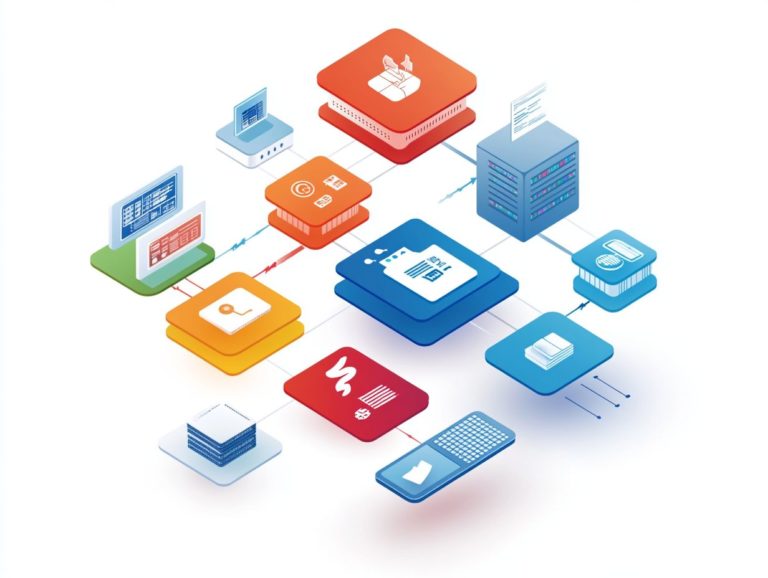Understanding SaaS Solutions
In today s fast-paced digital landscape, Software as a Service (SaaS) stands out as a game-changer for businesses like yours, offering a pathway to enhanced agility and efficiency.
This overview delves into what SaaS really is, unpacking its fundamental concepts while showcasing the benefits it brings think cost savings and scalability.
You ll also find insights into key features such as customization and integration that can elevate your operations.
Yet, it s important to acknowledge the challenges that come with it, particularly regarding security and data privacy. You ll receive essential tips for selecting the right SaaS solution tailored to your specific needs.
Discover how SaaS can transform your business and create exciting new opportunities!
Contents
Key Takeaways:
- SaaS is a software delivery model where applications are hosted by a provider and accessed over the internet.
- SaaS solutions provide cost savings and scalability, allowing businesses to pay for what they need and easily adjust to changes in demand.
- Customization and integration are key features of SaaS solutions, making them flexible and adaptable to meet the specific needs of businesses.
What is SaaS?
Software as a Service (SaaS) represents a cutting-edge cloud-based software delivery model that gives you the power to access applications effortlessly over the internet, eliminating the necessity for local installation.
This innovative approach makes things easier for you, allowing both businesses and individuals to leverage applications hosted by a service provider, thereby simplifying the complexities of software management and maintenance.
With SaaS, you can subscribe to services so you always have the latest updates, features, and security enhancements, all within a flexible and scalable environment tailored to your evolving needs.
Benefits of SaaS Solutions
The adoption of Software as a Service (SaaS) solutions offers you a wealth of advantages, including substantial cost savings and heightened scalability that can revolutionize your organizational operations.
By utilizing the power of the internet to store and manage data, you can significantly cut down on expenses tied to hardware and software maintenance.
You also gain the flexibility to scale resources to align perfectly with your unique requirements.
This agile approach allows you to concentrate on core business functions instead of being bogged down by IT management intricacies.
Cost Savings and Scalability
One of the most compelling advantages you ll find in adopting SaaS solutions is the significant cost savings that come with subscription-based pricing models and lowered IT expenses.
Unlike traditional software models that require a hefty upfront investment in licenses, hardware, and ongoing maintenance, SaaS sweeps in to eliminate many of these costs by offering a pay-as-you-go approach.
This means you can reallocate those funds to other vital areas, freeing resources for innovation and growth.
Moreover, SaaS applications come equipped with built-in scalability features, enabling you to adjust your subscription plans and resources as needed.
For example, during peak seasons, you can easily add or remove user licenses without the hassle of complex installations or extra fees.
This flexibility has proven invaluable for companies in industries like e-commerce and healthcare, where operational efficiency is paramount.
Key Features of SaaS Solutions
SaaS solutions offer an impressive array of key features designed to elevate user experience and streamline operational efficiency, making it essential to explore understanding the SaaS ecosystem.
With robust customization and integration capabilities, these solutions cater to your diverse business requirements, allowing you to tailor applications to your specific needs while ensuring they seamlessly connect with your existing tools and technologies.
Moreover, performance management stands out as a vital component of SaaS, giving you the power to monitor and optimize application usage effectively, thus driving your organization toward greater success.
In summary, SaaS offers flexibility, cost savings, and scalability that can help your business thrive. Embrace the change today!
Customization and Integration
Customization and integration are essential features of SaaS solutions. They give you the power to tailor applications to fit your unique workflows while seamlessly connecting with other tools via APIs.
This flexibility allows you to modify the functionality and appearance of your applications. This ensures they align with your operational processes and business objectives.
By enabling integration with various platforms and services, you can cultivate a cohesive digital ecosystem. This allows data to flow effortlessly between systems.
The functionality of APIs is crucial in this context. It facilitates interactions among diverse applications, simplifying task automation and information sharing while boosting overall productivity.
This interconnectedness helps you stay agile and responsive in a rapidly changing marketplace.
Challenges of Adopting SaaS
While Software as a Service (SaaS) offers a wealth of advantages, you may encounter challenges that could impede your adoption. These challenges are particularly relevant in the realms of security and data privacy.
As your organization embraces remote access models, the need for robust data security becomes critical. This is especially true when sensitive information resides in the cloud.
Understanding these concerns is crucial for making the right decisions about the SaaS solutions and providers that best meet your needs.
Security and Data Privacy Concerns
Security and data privacy concerns represent significant hurdles for organizations like yours when adopting SaaS. Sensitive information can be particularly vulnerable in the cloud.
To mitigate these risks, SaaS providers typically implement a range of robust security measures. These include advanced encryption methods, multi-factor authentication, and regular security audits.
These practices not only safeguard user data from unauthorized access but also foster trust between you and the provider. You must choose reputable vendors with a solid track record in data security.
Understanding the contracts that outline expectations and responsibilities can also help you clarify your needs. This ensures that any potential data breach is addressed swiftly and transparently.
This proactive approach enhances the overall safety of your cloud environments.
Choosing the Right SaaS Solution
When selecting the ideal Software as a Service (SaaS) solution, it s essential for you to carefully consider a range of factors. These factors should align with your organizational goals and user needs.
This includes evaluating pricing structures, the variety of services offered, and the reputation of the vendor. Making informed choices in these areas will set the foundation for successful implementation.
Factors to Consider and Tips for Selection
When selecting a SaaS solution, it s crucial to consider key factors such as pricing, features, and vendor reputation to ensure the perfect match for your organization.
Be sure to explore the wide range of service offerings available, ensuring the provider can meet your specific needs like customer support and security measures.
User reviews provide valuable insights into real-world experiences, highlighting the software s reliability and performance.
Evaluating the potential for seamless integration with your existing tools and systems is essential; compatibility can significantly enhance your operational efficiency.
To make informed decisions, conduct thorough research and create a checklist of must-have features. Engaging in trial periods can also help you test usability firsthand.
Frequently Asked Questions
What is SaaS and how does it differ from traditional software?
SaaS (Software as a Service) is a model where applications are hosted online and accessed remotely via the internet, unlike traditional software, which is installed locally on individual devices.
What are the benefits of using SaaS solutions?
SaaS solutions offer multiple benefits, including lower upfront costs, scalability, automatic updates, remote accessibility, and no maintenance or hardware requirements. For a deeper dive into understanding the SaaS delivery model, these solutions also allow for easier collaboration and integration with other applications.
How do SaaS solutions ensure data security?
SaaS providers use advanced measures to protect users’ data. This includes encrypting data, performing regular backups, setting up firewalls, and controlling access. Many companies also comply with important security standards and regulations.
What types of businesses can benefit from SaaS solutions?
SaaS solutions can benefit businesses of all sizes and industries. Small businesses enjoy cost-effectiveness and scalability, while larger corporations appreciate the ease of collaboration and integration. Industries such as healthcare, finance, and education also utilize SaaS solutions.
Do I need to have technical knowledge to use SaaS solutions?
No, one of the key advantages of SaaS solutions is their user-friendliness. You don t need technical knowledge; the software is managed and maintained by the provider, allowing you to simply log in and start using the application.
What should I consider when choosing a SaaS solution?
When choosing a SaaS solution, consider factors such as cost, features and functionality, data security, customer support, and the provider’s reliability. It’s also important to assess your business’s specific needs and choose a solution that aligns with them.





